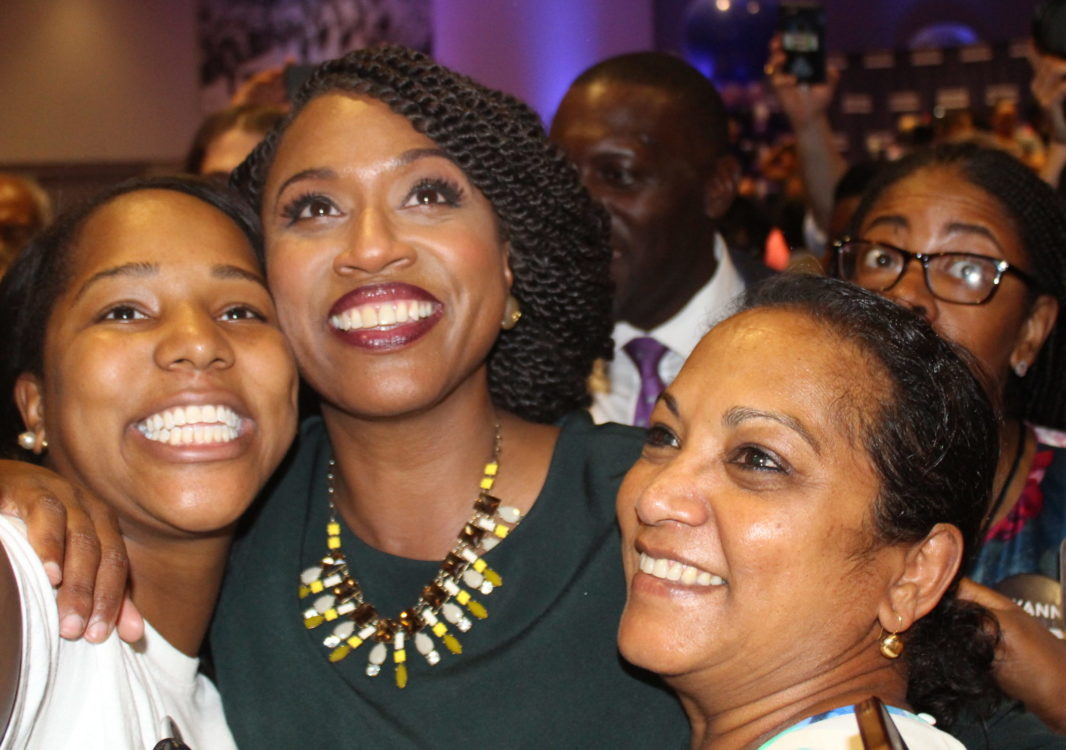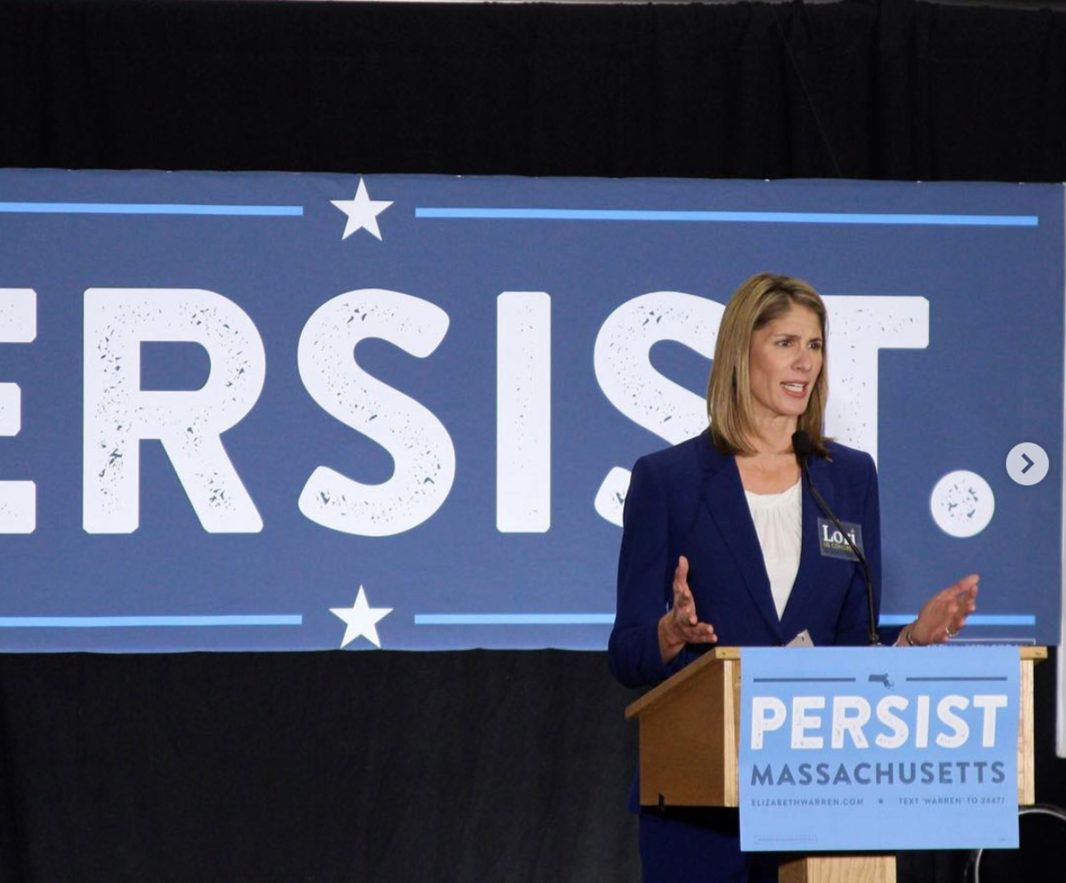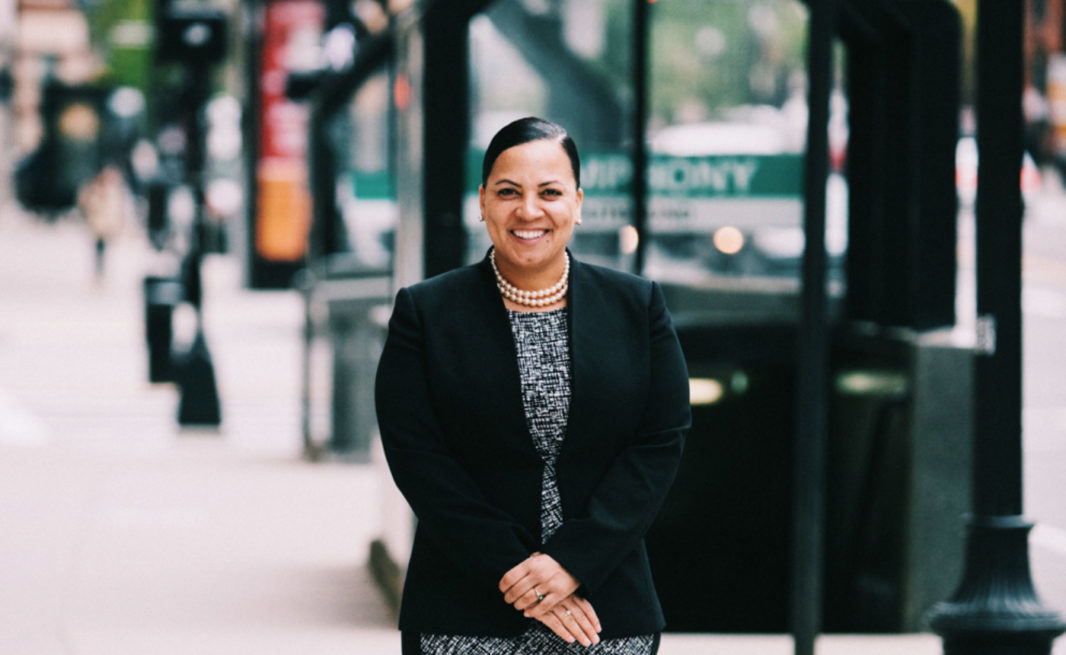Women did not go quietly into this goodnight during the midterm elections. Across the nation, and especially in Massachusetts, female candidates dominated in taking over offices traditionally held by men.
Massachusetts also became the first state in U.S. history to successfully defend transgender rights by popular vote. The Yes on 3 campaign declared victory with 69 percent of voters (as of press time) choosing to uphold a law that would protect transgender people from discrimination in public places. The ballot question would have repealed the state law passed in 2016 that banned discrimination of transgender individuals in places of public accommodation, such as restrooms, restaurants, and stores.
“It’s now clear that America—from coast to coast—supports protections for transgender and nonbinary people,” said James Esseks, director of the ACLU LGBT & HIV Project, in a press release. “Over the past two years, anti-transgender activists tried but failed to get a similar measure on the ballot in Washington state and in Montana. Last spring, voters in Anchorage rejected a related anti-transgender ballot measure. And now Massachusetts has sided with the transgender community. The failure of these anti-trans ballot tactics should prove, once and for all, that voters don’t want to discriminate.”
On a national level, the midterm elections delivered a huge night of firsts for women including the election of the first Muslim and Native American females to U.S. Congress, and New York’s Alexandria Ocasio-Cortez, at age 29, becoming the youngest woman ever elected to Congress. Another historic takeaway is that more than 90 women will become members of the House— the largest number in any U.S. election.
And the winners are…
Senator Elizabeth Warren

Photo: Banner Photo
Senator Elizabeth Warren celebrates her victory during a Democratic election night party at the Fairmount Copley Plaza
The crowd roared as the race between current Sen. Elizabeth Warren (D), Rep. Geoff Diehl (R), and entrepreneur Shiva Ayyadurai was called in Warren’s favor.
But it wasn’t much of a surprise. Warren, 69, was projected to win by several pollsters, and throughout the state, her signs peppered front lawns much more than any of her opponents.
A former Harvard Law professor and consumer protection advocate, Warren was first elected when she defeated Senator Scott Brown in 2012. Warren has been vocal in her opposition to President Donald Trump and is regarded as one of the nation’s top progressive senators. She is suspected to run for President in 2020.
Warren is known nationally for quoting Coretta Scott King on the U.S. Senate floor on Feb. 7, 2017, and being accused of violating Senate rules by Sen. Jeff Sessions (R), who was being nominated for U.S. Attorney General.
Senate Majority Leader Mitch McConnell’s defense of her sanctioning became a nationwide feminist battle cry, earning her supporters outside of her own state.
“Sen. Warren was giving a lengthy speech,” he said. “She had appeared to violate the rule. She was warned. She was given an explanation. Nevertheless, she persisted.”
Congresswoman-elect Ayanna Pressley

Photo: Catherine McGloin
Ayanna Pressley celebrating the major upset she delivered to 10-term incumbent Michael Capuano in the primary election
Boston City Councilor at-Large Ayanna Pressley rocked the Massachusetts political world by unseating 10-term Congressman Michael Capuano in September.
Now, she is officially Massachusetts’ first black congresswoman. And what a ride it has been for her to get to this place.
The 44-year-old African American was raised by her single mother, Sandra Pressley, on the north side of Chicago while her father battled addiction and spent much of her childhood in prison. Pressley, a Democrat, attended Boston University from 1992 to 1994—a time during which she was sexually assaulted. She left school to work full time at a hotel to support her mother.
Pressley, now of Dorchester, worked as a staffer for Senator John Kerry and Representative Joseph Kennedy II, eventually running for public office herself in 2009. She made history as the first woman of color elected to the Boston City Council in its over 100-year history. During her primary campaign, she ran on an anti-Trump platform, supporting issues like defunding U.S. Immigration and Customs Enforcement (ICE). During her campaign, Pressley refused corporate PAC dollars.
Pressley has long championed policies specific to women and girls, including support for reproductive health care and closing wage gaps.
No Republican ran against her, so she will head to Washington in Jan. 2019.
In an interview with Exhale, she was asked about 2018 being the “Year of the Woman.” She said, “Like so many others, I attended the Women’s March the day after Donald Trump’s inauguration, and we said, ‘First we march, then we run!’ They didn’t believe us. But here we are: record numbers of women running for office across the country. I am humbled to be a part of a movement that is clearly declaring that change can’t wait.”
Congresswoman Lori Trahan

Photo: Instagram
Democrat Lori Trahan wins the 3rd Congressional District seat in the Massachusetts midterm
In the 3rd Congressional District, Lori Loureiro Trahan of Westford beat Mike Mullen, an IT professional running as an Independent, and Rick Green, a businessman on the Republican ticket. Trahan, 45, was Chief of Staff to former U.S. representative Martin Meehan, and now heads ChoiceStream, a marketing company, and Concire Leadership Institute.
The three battled over a district with 37 cities and towns north and west of Boston. Current Congresswoman Niki Tsongas (D) has held the seat since 2007, but announced in August that she would not seek re-election.
Trahan edged out her closest opponent Dan Koh in a recount following what was initially a 10-candidate race in September’s primary, becoming the nominee for the Democratic Party.
Trahan grew up in Lowell as the daughter of a labor organizer and now lives in Westford with her husband and two daughters. She has stated publicly that she is an advocate for working families and veterans. “We need more women in Washington,” Trahan said. She co-founded a business consulting firm focused on technology with two other women after working for Meehan.
In her personal statement, she cites protecting the right to vote, women’s reproductive freedom, LGBTQ rights, gun reform, fair labor practices as major priorities, and said, “We need people in Congress who are going to fight to ensure every family gets a shot at realizing their dreams, and I plan to do just that.”
Suffolk County District Attorney Rachael Rollins

Photo: Racheal Rollins for Suffolk County District Attorney campaign
Rachael Rollins is the first black woman to serve as District Attorney in Massachusetts and the first woman DA in Suffolk County
Rachael Rollins is used to breaking records and pushing boundaries. On Tuesday night, she rose to the challenge and beat opponent Michael Maloney to become the first black woman to serve as District Attorney in Massachusetts and the first woman DA in Suffolk County.
Current Suffolk County DA Dan Conley, who has held the office since 2002, announced earlier this year he would not run for another four-year term.
At an Election Night victory party, Rollins said, “Voters sent a very clear signal today that our criminal justice system is not working for too many people and it’s time for a change. We will start by creating an office that adequately reflects the communities it serves and that is engaged with every neighborhood within the county.”
Rollins, 47, is famous for her list of 15 petty crimes she will not prosecute as a District Attorney. These include drug possession with intent to distribute, disorderly conduct, and larceny under $250.
At a recent rally in Boston, she said, “My superpower is that I have a spine of steel. One of my other superpowers is loving making people uncomfortable.”
Rollins is a former federal prosecutor who worked as general counsel to the state’s Department of Transportation and the MBTA. A native of Cambridge and a graduate of Northeastern School of Law, Rollins was the first legal intern in the history of the National Basketball Players Association.
After also acquiring a Masters in Law at Georgetown University in 1999, she returned to Boston to work as a field attorney for the National Labor Relations Board, where she investigated unfair labor practices and prosecuted violations of the National Labor Relations Act. She also worked as an Assistant United States Attorney, defending cases involving employment discrimination, gun trafficking, and child abuse.
Former Democratic Gov. Deval Patrick’s administration tapped Rollins to be the first person of color to serve on the General Counsel of MassDOT in 2011. Se also became the first female General Counsel of the MBTA. In her campaign literature, Rollins said she worked to increase the minimum wage for Logan Airport well before it was raised across the Commonwealth.
Rollins is the daughter of West Indian and Irish-American parents, and the oldest of five children.
Having seen some of her own siblings incarcerated and struggling with addiction, Rollins says she is “fully committed to changing the criminal justice system.”
At a recent campaign event, she said, “Overwhelmingly, those working in criminal justice criminalize poverty, mental illness, and addiction…[There are] so many other ways we can hold people accountable.” She advocates for restorative justice, offering solutions like rehabilitation to convicts.
Rollins is also vocal about limiting the access of the U.S. Customs and Immigration Enforcement in the Suffolk County community, saying she will end ICE access to DA databases. During her first 30 days, Rollins wants to implement a door-to-door security plan utilizing victim witness advocates, civil rights, and defense attorneys to escort undocumented immigrants to and from courthouses, as ICE has begun detaining immigrants in those instances.
Rollins plans to attack unsolved homicide cases involving victims of color, citing a Washington Post report that less than half of cases involving black victims are solved, calling this “unacceptable.”
Honorable Mention: State Representative-elect Tram T. Nguyen
Political newcomer Tram T. Nguyen (D) will be the next State Representative for the 18th Essex District, beating out incumbent Republican Jim Lyons of Andover. Lyons was so assured of his victory that he refused to meet Nguyen before Election Day for a debate. But boy were his tarot cards wrong. Nguyen, 31, in her first run for elected office, picked up an impressive endorsement from former first lady and Secretary of State Hillary Rodham Clinton.
Raised in Merrimack Valley, Nguyen attended Tufts University and Northeastern University School of Law. Nguyen’s family came to Massachusetts as political refugees from Vietnam when she was five years old.
A legal aid attorney for nonprofit Greater Boston Legal Service, she has worked on cases related to survivors of domestic violence, veterans, and children.
More Honorable Mention, Just Because
Incumbent Attorney General Maura Healey (D) has been re-elected in her role. “I’m so happy that I get to do it for four more years,” she said. Healey is well known for her more than two dozen lawsuits against President Donald Trump on subjects as wide-ranging as the travel ban, upholding environmental regulations, and the protection of part of the Affordable Care Act.
On the National Front
In New York’s 14th District, Democrat Alexandria Ocasio-Cortez, 29, became the youngest U.S. Congressional nominee. She handily defeated Republican Anthony Pappas with over 78 percent of the vote, according to early returns.
In the June Democratic primary, Ocasio-Cortez rocked the New York political world by unseating 10-term incumbent Rep. Joe Crowley (D), by an over 14-point margin.
In Kansas’ 3rd District, Sharice Davids made history to become one of the first two Native American women to serve in Congress, and the first open LGBTQ person to represent Kansas. Davids is a member of the Ho-Chunk Nation, and defeated four-term incumbent Republican Rep. Kevin Yoder.
In New Mexico, Democrat Debra Haaland defeated her opponent in the 1st Congressional District. Haaland is a member of the Pueblo of Laguna tribe.
In Michigan, Democrat Rashida Tlaib is one of two women to be the first Muslim females in U.S. Congress. Tlaib is endorsed by the Democratic Socialists of America, an organization that includes Ocasio-Cortez as a member.
In Minnesota, Democratic-Farmer-Labor Party’s Ilhan Omar made history with her congressional win, becoming one of two Muslim women to prevail in Tuesday’s midterms. She is also the first Somali-American member of Congress. Ilhan came to the U.S. more than 20 years ago as a refugee.



 10 min read
10 min read



